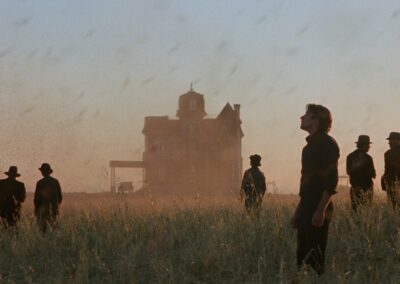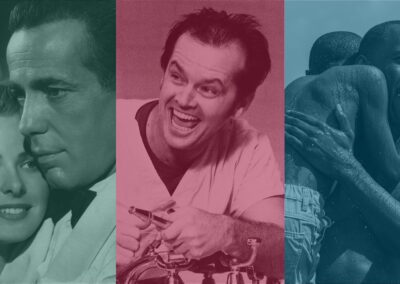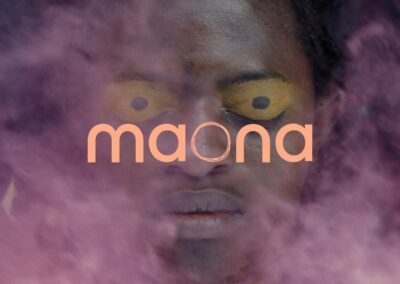There are not many film directors who have shaped my life since the early 1970s and still continue to do so to this day. Clint Eastwood, Woody Allen, Ken Loach and Martin Scorsese are about the only ones who spring to mind, so it is an absolute pleasure to see the Ultimate Picture Palace host a short Martin Scorsese retrospective over the coming months: there are several films being screened here which I urge you not to miss on the big screen and one or two which you could claim to be amongst the greatest films ever made. If we are lucky, an Eastwood, Loach or (more controversially) Allen season might follow. Who knows?
Martin (Marty) Scorsese, who is now 80 years old, is probably best known for two main reasons: his violent Italian American gangster crime films (most notably 1990’s “masterpiece” Goodfellas) which took up the gauntlet laid down by Coppola’s Godfather films in the early 1970s and literally ran with it (interestingly these better known works are not included in the UPP season) and his relationship with actor Robert De Niro (which is centralised in the season). It’s also worth noting that music-loving Scorsese has also made a number of excellent documentaries about American music (most notably The Last Waltz in 1976) and also gave a brilliant performance as an unhinged passenger in Taxi Driver, one of the most memorable director cameos of the century.
In the 1970s there was a sense that acting in American cinema was about good as it gets. Think for a moment about the quality of the ensemble work done in, for example, The Godfather movies, One Flew Over the Cuckoo’s Nest, Dog Day Afternoon, The Deer Hunter and Network, for instance. I remember a number of these male actors (Gene Hackman, Dustin Hoffman, Al Pacino, James Caan, Richard Dreyfuss and Roy Scheider) being described as “the kind of guys you wouldn’t buy a used car from.” There was an edginess about them – a toughness, a lived in quality and a mean streak that was generally missing from the big stars of Hollywood’s heyday. These actors were prepared to take risks and were often happy to play unsympathetic characters with flaws writ large on their craggy, unattractive faces. They seemed to have genuinely inherited Brando’s crown whilst he himself grew saggy and undisciplined (although, lest we forget, also managed to be staggeringly good in Last Tango in Paris and Apocalypse Now, as well as The Godfather, of course).
For me, the best of the bunch at the time, however, was De Niro and those, like me, who grew up with this man’s performances etched on their souls, will never forgive him for the slide into hammy mediocrity which followed his incendiary work in the 1970s, when he was genuinely an actor “on fire.” With hindsight he was an obvious choice to play the young Vito Corleone in The Godfather Part Two. He was also electrifying in The Deer Hunter but the films which really consolidated his reputation as one of the most magnetic actors ever, were all directed by Scorsese.
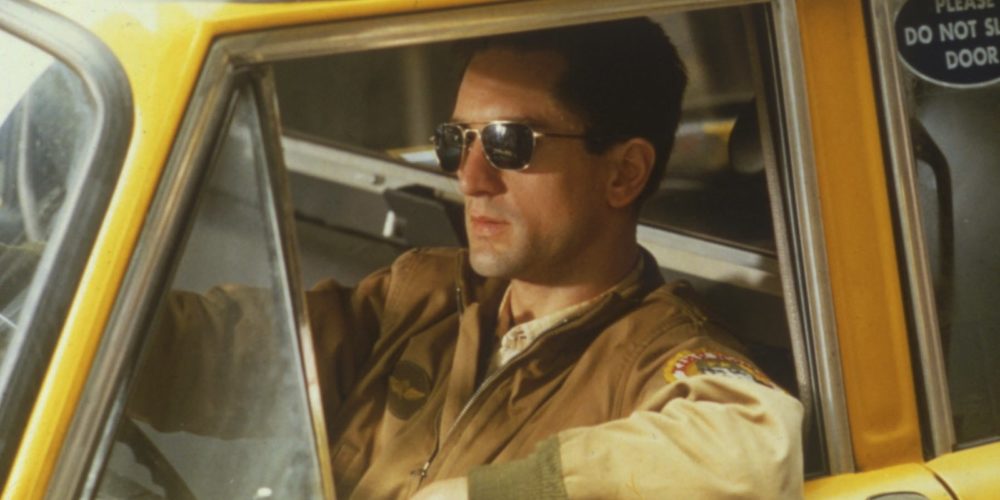
1976’s Taxi Driver (which kicks off the season on 18 March) a film which blew me away when I first saw it as a double bill with Malick’s Badlands in the late 70s; 1977’s under-appreciated musical New York New York (De Niro learned to play saxophone in this tribute to Cukor’s A Star is Born) and 1980s Raging Bull (after which he was never quite the same) are all supreme examples of an actor at the top of his game – dangerous, disaffected, rebellious, slightly punch-drunk but with a beatific grin. The relationship with Scorsese continued into the 1980s and 90s and the two did good work in 1983’s dark media satire The King of Comedy (screening at the UPP on 24 April); 1990’s Goodfellas; 1991’s Cape Fear (his Max Cady is deliriously psychotic, if OTT) and 1994’s Casino, after which they went their separate ways before re-uniting for 2019’s underwhelming Netflix crime opus The Irishman. In addition to the Scorsese films, De Niro was also outstanding in Leone’s Once Upon a Time in America (1984), Michael Mann’s Heat (1995) and Tarantino’s Jackie Brown (1997). But he also made about 30 other movies – many of which are unwatchable (Bad Grandpa, anyone?).
Scorsese, of course, went on to work closely with other actors – Daniel Day Lewis (who you can see being used to good effect in period Romantic drama The Age of Innocence on 26 March) and Leonardo Di Caprio (who stars, alongside De Niro, in “Marty’s” next film Killers of the Flower Moon, due later this year) and also made a number of great movies without any of these: 1985’s little seen black comedy After Hours (included in the season on 1 April and highly recommended) and the Nic Cage starring Bringing Out the Dead (1999) being good examples. We should also not forget that Harvey Keitel, for a while De Niro’s right hand man, also did excellent work for the director, beginning with Mean Streets in 1973 and 1974’s “woman’s picture” Alice Doesn’t Live Here Anymore, as well as Taxi Driver plus, arguably, Scorsese’s most controversial movie The Last Temptation of Christ from 1988 (there were rumours De Niro would play Jesus – the part finally going to Willem Dafoe – Keitel somewhat inevitably plays Judas). This is also one ripe for rediscovery (not least for its eccentric cameo by none other than David Bowie as Pilate) and you can judge for yourself whether it’s Scorsese’s most personal work when it screens in time for Easter on Sunday 9 April.
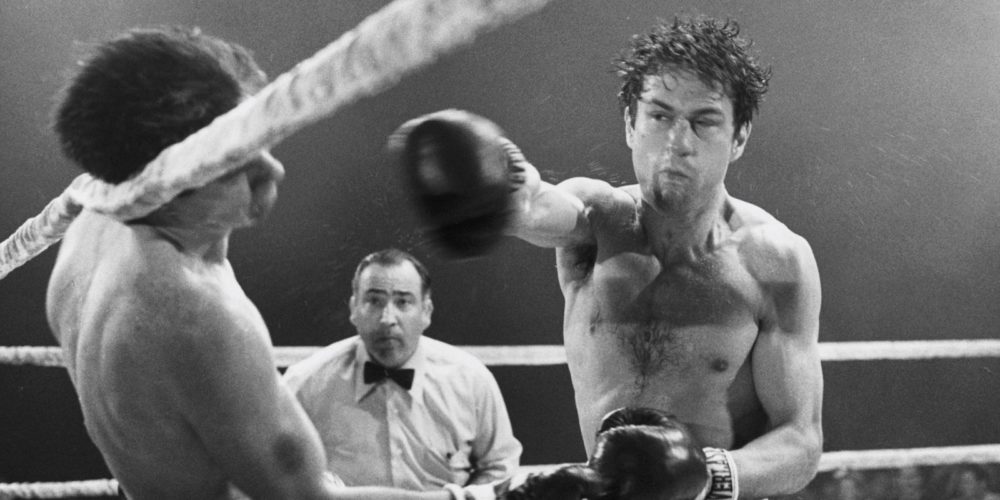
1980’s Raging Bull, which will be screening in a new digital print on 15 April, is possibly the film you should be most excited by in the season, however and a film that shows both Scorsese and De Niro (and Joe Pesci) at their finest. Written by regular collaborator and Taxi Driver scriptwriter Paul Schrader, who surprisingly went onto be another of those directors I’d add to my list of film makers whom I first encountered in the 1970s and who still make interesting films all these years later (2017’s First Reformed and 2021’s The Card Counter were amongst my favourite films of their respective years) and shot in glorious black and white by Michael Chapman (who had previously been the cinematographer on Taxi Driver as well as, amongst others, Hal Ashby’s The Last Detail (1973), Martin Ritt’s The Front (1976), Phil Kaufman’s Invasion of the Body Snatchers remake (1978) and Schrader’s Hardcore in 1979 – Raging Bull is a work of real (often raw) genius.
Readers may have noticed that I have made no reference to women so far in this article and that’s not an accident. If you want to criticise Scorsese then it’s probably because his films almost always explore ideas about masculinity and, therefore, inevitably women are often given supporting roles in his movies. That’s not to say there are not great female performances in his work: Ellen Burstyn in Alice, the teenage Jodie Foster in Taxi Driver, Liza Minnelli in New York, New York (more or less playing her mother, Judy Garland), Barbara Hershey (as Mary Magdalene) in The Last Temptation of Christ, Lorraine Bracco in Goodfellas and Sharon Stone in Casino are all stunning. However, Raging Bull (which features little known actress Cathy Moriarty in her debut) is a film absolutely obsessed by what it means to be a male and how the masculine mindset (at its most extreme) can be corrupting, damaging and dangerous – especially (but not exclusively) to women.
Heavyweight boxer Jake La Motta (and yes, De Niro really did put on the weight for the film’s coda) is lethally toxic, to use today’s parlance, and is a genuine threat to all who come within a few feet of his fists. He is man who thinks physically and whose every action is based on his strength, physique and “hardness.” It’s a bravura performance in a dazzling piece of cinema. De Niro may not have the manic energy of Travis Bickle in Taxi Driver but there’s lowdown meanness in his sloping gait and yet a balletic beauty in the epically staged and searingly savage boxing matches shot so memorably by Scorsese and his crew. It is films like this that allow you to forget that the director was also responsible for the mediocre Silence and mis-firing Hugo (most definitely not included in the season) and the actor went on to be something of an embarrassment.
Just, roll with the punches and enjoy the spectacle of Scorsese and De Niro at the absolute top of their game in a film that will leave you feeling like you’ve just gone 12 rounds with the guy: pulverised into submission…but in a good way. The Scorsese season at the UPP reminds us that, in the hands of its finest collaborators, cinema is our most magnificent medium and, without doubt, the C20’s greatest art form. Enjoy – even if you do end up watching through the cracks in your fingers.
CLICK HERE TO VIEW THE FULL SCORSESE SEASON LINE-UP AND LISTINGS
Dr Andrew C Webber is a Film teacher and examiner with over 37 years’ experience. He currently contributes to both the Cinema of the 70s and 80s magazines (available on Amazon); cassette gazette fanzine (available from cassette pirate on e-bay) and the Low Noise music podcast available on Spotify and Apple podcasts.
